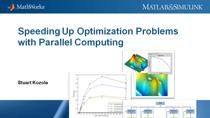Speeding Up Algorithms: When Parallel Computing and GPUs Do and Don't Accelerate
Michael Weidman, Quantitative Support Services
Aly Kassam, Quantitative Support Services
Most of us have multiple cores as well as a graphics processing unit (GPU) in our desktop computer, with grids and clouds readily available at arm’s length. While popular hype purports that it’s easy to use such resources to facilitate massive speed-up of numerical computing at practically no cost and effort, the reality is of course somewhat different. In this presentation, Aly and Michael use MATLAB valuation and backtesting examples to look at the sorts of calculations that can be sped up by CPUs, GPUs, and server-based solutions, and they suggest a common-sense framework to help answer the questions:
- When does it make sense to go to a GPU or cluster?
- What changes are reasonable or unreasonable to make in your program and workflow?
- What are the costs and risks of speed-up, and how can we mitigate against them?
Recorded: 19 Sep 2013




